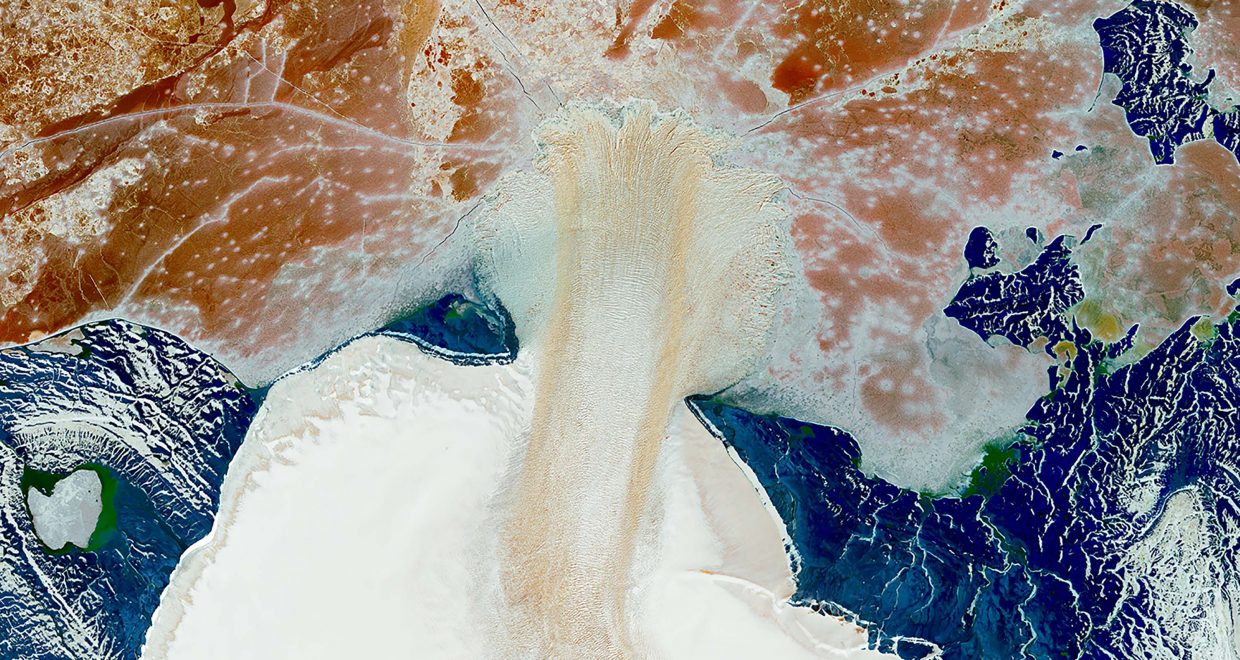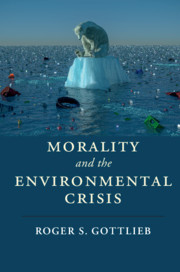Dread, the Demonic, and our Current Situation
Leaving aside the raging pandemic, and recognizing that Covid is not unconnected, there are two crises which define our time. First, the global weakening or collapse of democracy and rise of fascism: e.g., Trumpism in the U.S., repressive Indian Hindu nationalism, conservative Catholicism in Eastern Europe, Chinese “authoritarianism” (market Stalinism?), and whatever is going on in Brazil. Second, an environmental calamity comprising, but not limited to, climate change, species loss, deforestation, and global pollution of air, water, earth and our own blood streams.
Much real and virtual ink has been and will continue to be spilled in trying to comprehend all this (the collapse of modernity will doubtless be the best chronicled fall of a civilization). To add to the mix, here are insights from an unexpected source: the nineteenth century Danish philosopher/theologian Soren Kierkegaard—famous, for those unacquainted, for among other things introducing the notion of a “leap of faith” into common parlance (though the phrase is almost never used as he intended).
Of Kierkegaard’s vast writings I offer two related concepts—dread and the demonic—which might provide a little psychological illumination of our common and desperate social, ecological, and moral predicament. I will map them onto what seem to me—both from what I’ve read and what I’ve done at times myself—are widespread responses to the present moment.
“Dread” (or anxiety—translations vary) is not, Kierkegaard tells us, a simple matter of fear. It is simultaneously fear and attraction, a kind of despairing fascination in which we recognize a real threat which is also, and paradoxically, something which holds a compelling attraction. As we walk along the narrow mountain path, we are repelled by the prospect of the vast drop below. But we are also so attracted to the vista that we feel a shudder of anxiety at the possibility that we might dive off into the abyss—or become so affected by the terrifying prospect that we faint with fear and fall over.
The “demonic” comprises a variety of responses, all of which serve to shield us from the necessity of moral and (in our times, and necessarily) political commitment. It often begins with forms of self-isolation in which relating to other people (and, for Kierkegaard, to God) drastically dwindles. The self, to use a modern phrase, becomes a gated community of one or at the least a pretty small nuclear family. In this isolation, we retreat into a boring existence in which nothing has much significance or meaning. The flip side of isolation and meaninglessness are erratic shifts of personality and attention. The demonic, in essence, is an attempt to evade responsibility for our essential human freedom, a freedom that can be expressed in the creation and fulfillment of a moral identity or avoided by escapism and unconcern. The global rise of depression is one example of the “boredom” in which existence loses meaning. The erratic shifts are exemplified in the constant stream of media stimulation and the experience of self-induced change of focus as we surf the endless enticements of the internet and cell phone distractions.
These concepts in hand, let’s look at some possible responses to declining democracy. To begin, current political reality may strike us with horror, a horror mitigated at first by disbelief. It simply can’t be that a lying, racist, sexist, pretentious, buffoonish sociopathic con man can be elected; and that no scandal, stupidity, or cruelty does much to lessen his appeal to nearly half of U.S. voters; or that the man who murdered Gandhi is now for many Indians a national hero; or that one-third of Poland has, village by town by city, declared itself a “gay-free zone”; or that China is virtually imprisoning millions of people with impunity; or…well, fill in the blanks.
Along with the mix of horror and disbelief, however, for many there arises a kind of Kierkegaardian dread. If we are lucky enough to live in a blue state or a blue town; if our employer and friends share our contempt for the Right, we can respond to the siren song of the demonic and just, well, stop paying attention. Notice how much less we read the news, go to demonstrations, or protest the atrocities of Trump’s corruption and his attacks on environmental regulations; or how the rising oppression of faraway countries tends to blur into a distasteful, nagging negativity. There is so much of it that we can barely pay attention—let alone offer aid to the resistance. The political world starts to empty of meaning, as we find ourselves simultaneously repelled by the terrible things happening, contemptuous of the enablers of fascism and the bystanders who simply seek their own private, limited welfare, and yet are also seriously attracted by that latter response. So we escape into our own ghettos of likeminded, more or less (for how long, who knows?) well off acquaintances; or under Covid we content ourselves with new recipes and catching up on our reading. At the least, burdened by dread and feeling the economic and health effects of Covid plus climate change, we would like to.
A similar dynamic can play out with regard to the environmental crisis. The heat, the floods, the fires, the pollution, the endlessly rising C02 levels (yes, despite Covid)—if it’s not our house turned to ashes, our farm under water for six weeks, our drinking water laced with lead, we shake our heads in regret and short term sympathy, and proceed with whatever else we’ve been doing. We know that it is our participation in a form of life marked by fossil fuels, high consumption, meat, and all the rest that is part of the problem. And that this is joined by widespread political passivity that allows the destructive environmental regime to continue. Yet our horror at the inevitable effects of our actions combines with the attraction (the other side of dread) to precisely what our actions do for us in the short term: the ease, the range of consumer choices, the unthinking driving, heating, air conditioning. And the way we can attend to so many other things that our culture and class positions tell us require our immediate and complete attention: career, our sex life or our waistlines, getting our kids into good schools or finding them good therapists, buying a new house, decorating our little condo, caring for aging parents, suffering under an abusive boss, getting a job, feeding our family.
Note that in Kierkegaard’s account dread and the demonic reinforce each other. A gray and boring world doesn’t command much attention; and a lack of attention diminishes understanding and meaning. If all significance revolves around the isolated self or very small group, there won’t be much of either significance or self. How much importance can we load onto a world of a single person, or just a few? And this is especially true because in the face of a relentless media onslaught to cultivate self-absorption we must avoid realities which we well know are there. And, as Jean-Paul Sartre observed, to repress or avoid something we need to be aware of it—else how can we make sure it is repressed and avoided? So in the back of our minds, in the quickly deleted emails of which we just note the subject line (“Crackdown on Protestors,” “Dissidents Arrested,” “Brazilian deforestation sets new record,” “Wildfires rage in Arctic”) what we’ve tried to avoid makes a brief, frightening appearance. Thus the repression of awareness makes the world a little grayer each day. Soon we may suffer from a malady Kierkegaard called a “disorder of feelings—the disorder consisting in not having any.”
Alternatively, we can turn to hyper stimulation. When Covid ends we can return to ‘eco-tourism,’ buy what are certain to be increasingly realistic virtual headsets, turn from one hobby or interest to the next, ferociously pursue more money, better looks, more successful children, or remodel the kitchen. Each will occupy us for a time, but then the dread of the world will return and we will need more engrossing activities, more stimulating media and—probably—more psychiatric medication.
I wish I could end with the good news. But, truthfully, there isn’t much. Courageous civil servants, many of them registered Republicans, saved at least a shred of democracy in the U.S. Resistors to both fascism and environmental destruction exist in every country. I suspect that like the Jewish resistance to the Holocaust, these efforts are stunning moral beacons headed for defeat. Win or lose, however, I suspect the resistors live lives that are not self-absorbed, gray, or shaped by incoherent shifts of attention and stimulation. They are, rather, the very opposite of the demonic.
As Kierkegaard would put it: the decision to be ethical is always possible. And the ethical life—with all its pain and loss—is better than the demonic. In our dread, but despite it, we still have a choice.








Dear Roger,
Thank you for an incisive article on Dread. the Demonic and our current situation. It gives attention to the general malaise when words no longer connect with meaning (see On Water and Time by Andri Snaer Magnason). I find I am drawn to Hannah Arendt in my own quest for hope, the place of forgiveness with respec to the past and opportunity for promise as we make our way as agents into the mist of the future. As I read your blog this came to me as offering meaning grounded in an existential life.